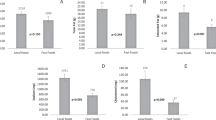Abstract
Objective: To assess the intake of trans fatty acids (TFA) and other fatty acids in 14 Western European countries.
Design and subjects: A maximum of 100 foods per country were sampled and centrally analysed. Each country calculated the intake of individual trans and other fatty acids, clusters of fatty acids and total fat in adults and/or the total population using the best available national food consumption data set.
Results: A wide variation was observed in the intake of total fat and (clusters) of fatty acids in absolute amounts. The variation in proportion of energy derived from total fat and from clusters of fatty acids was less. Only in Finland, Italy, Norway and Portugal total fat did provide on average less than 35% of energy intake. Saturated fatty acids (SFA) provided on average between 10% and 19% of total energy intake, with the lowest contribution in most Mediterranean countries. TFA intake ranged from 0.5% (Greece, Italy) to 2.1% (Iceland) of energy intake among men and from 0.8% (Greece) to 1.9% among women (Iceland) (1.2–6.7 g/d and 1.7–4.1 g/d, respectively). The TFA intake was lowest in Mediterranean countries (0.5–0.8 en%) but was also below 1% of energy in Finland and Germany. Moderate intakes were seen in Belgium, The Netherlands, Norway and UK and highest intake in Iceland. Trans isomers of C18: 1 were the most TFA in the diet. Monounsaturated fatty acids contributed 9–12% of mean daily energy intake (except for Greece, nearly 18%) and polyunsaturated fatty acids 3–7%.
Conclusion: The current intake of TFA in most Western European countries does not appear to be a reason for major concern. In several countries a considerable proportion of energy was derived from SFA. It would therefore be prudent to reduce intake of all cholesterol-raising fatty acids, TFA included.
Sponsorship: Commission of the European Communities (AIR 2421); National Funds; European Industries supported the chemical analyses.
This is a preview of subscription content, access via your institution
Access options
Subscribe to this journal
Receive 12 print issues and online access
$259.00 per year
only $21.58 per issue
Buy this article
- Purchase on Springer Link
- Instant access to full article PDF
Prices may be subject to local taxes which are calculated during checkout
Similar content being viewed by others
Author information
Authors and Affiliations
Contributions
For authors' affiliations see appendix 1
Rights and permissions
About this article
Cite this article
Hulshof, K., van Erp-Baart, M., Anttolainen, M. et al. Intake of fatty acids in Western Europe with emphasis on trans fatty acids: The TRANSFAIR study. Eur J Clin Nutr 53, 143–157 (1999). https://doi.org/10.1038/sj.ejcn.1600692
Received:
Revised:
Accepted:
Published:
Issue Date:
DOI: https://doi.org/10.1038/sj.ejcn.1600692
Keywords
This article is cited by
-
Serum non-esterified fatty acid levels and hip fracture risk: The Cardiovascular Health Study
Osteoporosis International (2021)
-
Trans fatty acid intake among Chinese population: a longitudinal study from 1991 to 2011
Lipids in Health and Disease (2020)
-
Fatty acid profile of processed foods in Greece with focus on trans fatty acids
Journal of Consumer Protection and Food Safety (2020)
-
Inadequate daily intakes of n-3 polyunsaturated fatty acids (PUFA) in the general French population of children (3–10 years) and adolescents (11–17 years): the INCA2 survey
European Journal of Nutrition (2019)
-
Trans-fatty acid levels in erythrocytes in Europe
European Journal of Nutrition (2017)


